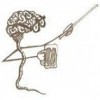Othello, anyone??
OMG!! I absolutely, positively, HATE the play, Othello, by Shakespeare!!
The language isn't the problem, although it contributed. The problem is due to the overwhelming deceit and manipulation!! It was too hard to keep track of, just insane!! Plus, I swear, I know a family of 'Iago's', and they aren't the best people to be acquainted with....
I just spent the day rewriting my essay...finished about an hour ago, and then re-read it to make sure it was okay. I'm finally done with it. YEAH!!
Celebrate with me - NO MORE OTHELLO!!!!





 Hey, did you know, Shakespeare stole most of his stories from other people, as copyrights didn't exist until around his time.
Hey, did you know, Shakespeare stole most of his stories from other people, as copyrights didn't exist until around his time.  Therefore, he might've stolen that story from some other writer, like he did with "Romeo & Juliet."
Therefore, he might've stolen that story from some other writer, like he did with "Romeo & Juliet." 

That is a grotesque over-statement at the very best, and ... in truth something that I won't say because it would be insulting and against HP policy. He wrote plays that were derived from myths, stories and belief systems, combining ideas and collecting morals from vast reading into finely tuned stage versions that included dialoge and setting that were uniquely English and entirely sculpted to the audience and social milieu of the time--over and over again, with such volume as to preclude his ability to have stolen them all and yet maintain such a consistent voice and genius.
To sling out "he stole it from other people" in such an unqualified and simplistic manner suggests a gross lack of historical context, a glaring absence of studious approach to literary history, and a total unwillingness to have searched out the actual texts from which he "stole" and the work of "comparing" the texts he wrote to them with an eye for not only plot-based differences, but the incredible and unmatched to this day artistic genius that marked his incomprable gift for language. If you truly think he "stole" anything but the most generic plots relating to human existence, then you have no idea what great writing looks like.Well Shades, I'll give you that. I may have gone too far when I said Shakespeare stole most his plays, as I'm sure he wrote most of them himself. The proper wording should have been "some of them were ripped off from previous works." There's no disputing the historical facts that some of his plays like "Romeo & Juliet" were ripped off from other writers before his time if you look back on history.
Although to be fair, he did add a couple of unique twist to the story by making the two main protagonists teenagers, and had the story take play in a limited time frame, in order to make his audience question whether or not, they were truly in love or in lust with each other.
Like I said, there's no disputing he was a creative genius, and many of his stories do stand the test of time to this day. However, if you analyze and research every one of his plays, you'll find that some of them carry many similarities to plays that came out BEFORE his.
I haven't seen a play since high school, but I read Othello. I liked it.
lol, WS - was the first to pen nearly 1700 words, as in the actual word!
including:
perusal
pious
premeditated
radiance
reliance
road
sanctimonious
seamy
He was most certainly an original.
Ill go with Shades and suspect a lack of knowledge in literary history, How many plots do we as writers work with?okay, since i have a feeling many of you are going to attack my opinion, then i'll gladly show you my source then to confirm my previous posts, then you all can judge for yourselves. Look, I never said Shakespeare wasn't a creative genius, as he certainly is. I just said that not all his stories were originally of his own ideas, if you look back at history to confirm this. However, since many of you want to say that I'm ignorant and claim I have a lack of literary historical knowledge, then read the link i provide below, and then say that.
The truth is, we can probably debate this all day, but I won't delve further into this, as it would be pointless. The reality is that although not all of Shakespeare's stories were originally his own, he did do a great job on IMPROVING and EXPANDING on the ideas of the previous stories that were used.
http://en.wikipedia.org/wiki/Romeo_and_JulietThe only thing I'd want to know is this: How did any of you know that Shakespeare had been influenced by prior works? Neither my book nor my instructor said anything about it....
Well it's well documented if you check out his history thoroughly. Look, there's no disputing the man was a creative genius, and he was able to take a story and turn it into an epic that stands the test of time, with his bold approaches to stage drama. Nobody can refute that.
However, if you ever go back and read about where he got some of his play ideas from, a lot of them were based off previous stories told in the past. Granted, he made changes to the stories he used as inspiration and borrowed from, but that still doesn't diminish the source.
Like if you read the link I gave out thoroughly, it even says that "Romeo & Juliet" borrows from other stories made prior to Shakespeare's influence. In fact, the original story was based off an Italian story called, "The History of Romeus and Juliet" by Arthur Brooke in 1562. Then William Painter retold that very same story in "Palace of Pleasure" as a prose in 1582. Of course, this later prompt William Shakespeare to borrow heavily from both versions of this story, but he did put in his own changes on it by expanding the story a bit, AND expanding the roles of the supporting characters, Mercutio and Paris, specifically.
Another story he had influences for was "Othello." "Othello" is an adaptation of "Un Capitano Moro", written by Italian writer Cinthio. Although some historians believe that Shakespeare had influences outside of Cinthio's original story, when he wrote "Othello." However, "Othello" closely follows "Un Capitano Moro" fairly closely, but he does change a few details though to enhance the story like he did with "Romeo & Juliet." Such changes include Brabantio, Roderigo, and several minor characters absent in "Othello", and Shakespeare's Emilia takes part in the handkerchief mischief while her counterpart in Cinthio's story does not. Anyways, I could probably go on forever, but you get my point though. Listen, I apologize to anyone that I might've offended with my previous statements, but we have to give credit where credit is due. We can't ignore the obvious here.
Was Shakespeare a great writer? Yes he was.
Was Shakespeare a creative genius? You bet.
Was Shakespeare's stories entirely of his own ideas? Certainly not, but he did improve on them quite a bit, from the ones that he did borrow.
Anyways, I just thought I'd throw in my two cents.
By the way, Shades, you really shouldn't take life too seriously, or you'll never get out of it alive.

kewl
 thanks for the info. so, I take it you've studied literature - in order to know Shakespeare's history. I'm just wondering how much education it would take before I'd learn this...I mean, it has to be documented in order to be discovered through research, and if it's documented, it ought to be taught alongside his works. at least to my way of thinking....
thanks for the info. so, I take it you've studied literature - in order to know Shakespeare's history. I'm just wondering how much education it would take before I'd learn this...I mean, it has to be documented in order to be discovered through research, and if it's documented, it ought to be taught alongside his works. at least to my way of thinking....It ultimately depends on the person Rafini. I don't have a degree in this stuff if that's what your asking. However, I have done some research on Shakespeare's previous works, in the past, during my free time. It's fun for me, and it's interesting to learn. As far as things being taught about Shakespeare goes, it really depends on who's teaching the class, as many instructors will only teach you from their own perspective on history.
This is kind of why I always try to go by what my American History II College professor told me once: "Your not supposed to believe everything I tell you about history. Your supposed document what I say, then do your own research into it, to develop your own opinion on historical events."That sounds like a good plan. I'm discovering I like college much better than high school, because in college it's acceptable to have your own opinion on things, whereas in high school you were supposed to be learning someone elses opinions - no matter how much they went against your own belief system. It was difficult.
Yeah, I agree. I think when it comes to American high schools, at least, the instructors often have to deal with overcrowded classrooms, with some students that don't even like being there, so many of them seldom have time to discuss with every student their own individual perspectives on things. Therefore a lot of them get treated as more of a number rather than an individual.
Whereas in college, it seems like they try to encourage more individuality versus being treated as a number. Plus, it helps that many college students want to be there to learn, so it makes it easier for instructors, at colleges. lol.
Stevennix2001,
There is nothing new under the sun.
If you want to go even further back, according to the Greeks (Aristotle, et al), there are only three plots, and everything else is a variation of one of these plots:
Man versus nature (his own nature - himself)
Man versus man (another man)
Man versus the Gods (authority)
So, yes, as Shades pointed out, Shakespeare was a great plot borrower, but his contribution to drama and literature is incredible.
Musicians of the classical and baroque eras were also great borrowers, too. They thought nothing of borrowing part of another composer's work, and composing another work based on the borrowed piece. These were considered a sincere tribute, and published under titles such as Mozart's "Variations on a Theme" or "Johannes Brahms' Variations on a Theme by Joseph Haydn" - that's kind of the musical equivalent of a playwright borrowing a plot.


- Home Girlposted 15 years ago
0
Who cares??? A great artist borrowed some clay from the earth and created the masterpiece. Nobody remembers that one Cinthio or smth. but Shakespeare still inspires us (if we care to read him at all).
I guess the word of contention here was 'stole' - as pointed out quite clearly, Shakespeare's basic plots were not always of his invention (in fact, rarely - Midsummer Night's Dream is the one often quoted as being most of his own devising), but it is what he did with the stories that made him stand out.
Fact is, the tendency of the writers in his time was to use the tales that had already been told and present them in the playhouses in their own style. Shakespeare was doing what was expected then - but the way he did it was surely beyond expectation and can still amaze, amuse and stimulate us today.
In getting away from the idea of 'stolen', though, don't lose sight of the fact that he could remain very faithful to his source! For a brilliant example of how Shakespeare could take a tale already worth telling and improve upon it - while staying very close to its facts - see the decription of Cleopatra's arrival in Tarsus to meet with Anthony. Here's a translation of an account by Greek historian Plutarch (who lived about 46-120 CE):
"She sailed up the River Cydnus in a barge with a poop of gold and with purple sails, her rowers stroking the water with oars of silver that kept time to the music of flutes and pipes and lutes. As for Cleopatra herself, she reclined under a canopy of cloth of gold, dressed as that Aphrodite we see in paintings while on either side stood pretty little Cupids who cooled her with their fans. In her crew were the most beautiful of her women clothed as Nereids and Graces, some at the helm, some tending the tackle and the ropes of the barge, out of which came a wondrous sweet smell of perfumes that wafted over the river banks. A multitude of people raced to the riverside to view her progress and the city emptied to see her. As the crowds fled away, Antony sat enthroned in the marketplace to await the queen. At last, he was left sitting alone, while the word spread on all sides that Aphrodite had come to play with Dionysus for the happiness of Asia."
(http://cornellia.fws1.com/Ancientworlds … opatra.htm)
Great description already. Now, here's The Bard:
"The barge she sat in, like a burnish'd throne,
Burn'd on the water: the poop was beaten gold;
Purple the sails, and so perfumed that
The winds were love-sick with them; the oars were silver,
Which to the tune of flutes kept stroke, and made
The water which they beat to follow faster,
As amorous of their strokes. For her own person,
It beggar'd all description: she did lie
In her pavilion, cloth-of-gold of tissue,
O'er-picturing that Venus where we see
The fancy outwork nature: on each side her
Stood pretty dimpled boys, like smiling Cupids,
With divers-colour'd fans, whose wind did seem
To glow the delicate cheeks which they did cool,
And what they undid did."
"Her gentlewomen, like the Nereides,
So many mermaids, tended her i' the eyes,
And made their bends adornings: at the helm
A seeming mermaid steers: the silken tackle
Swell with the touches of those flower-soft hands,
That yarely frame the office. From the barge
A strange invisible perfume hits the sense
Of the adjacent wharfs. The city cast
Her people out upon her; and Antony,
Enthroned i' the market-place, did sit alone,
Whistling to the air; which, but for vacancy,
Had gone to gaze on Cleopatra too,
And made a gap in nature."
(Antony and Cleopatra - Act 2; Sc. 2; spoken by Enobarbus)
I absolutely love Antony sitting alone 'whistling to the air' which - if it could - would also have 'gone to gaze on Cleopatra'!
And I love the discussion above about finding things out for oneself. The things we learn out of our own interest are the ones that stay with us.
If you are interested in sources (and other Shakespeare-related matters), a useful site (of the very many out there!) is this:
http://www.shakespeare-online.com/sources/
Enjoy!
Related Discussions
- 33
Shakespeare's Sonnet-Translation to modern English
by karthu 16 years ago
Shakespeare has written many sonnets and you know it is hard to get what he meant.Here is the translation of his sonnets into modern english which anyone can understand...
- 70
What is your favorite Shakespeare play?
by Old Empresario 14 years ago
If you don't have a favorite, which is your least favorite? I'm interested to know.
- 15
Do you feel that Shakespeare's stories are just as powerful now as they were in
by Deb Hirt 12 years ago
Do you feel that Shakespeare's stories are just as powerful now as they were in his day?
- 56
Does anyone have any interesting UFO/abduction stories?
by andrew savage 12 years ago
Have you, or anyone you know of, ever had a close encounter? When did it take place? Were there any drugs involved? Did you tell the authorities? What race of aliens were involved? Was the experience angelic or demonic in nature? Did the ones who made contact with you seem good or evil? Did you...
- 14
What are some tips for reading and understanding Shakespeare?
by Melanie Palen Shebel 14 years ago
What are some tips for reading and understanding Shakespeare?
- 38
Anyone have any REAL GHOST STORIES to share?
by Shannon 8 years ago
Anyone have any REAL GHOST STORIES to share?












